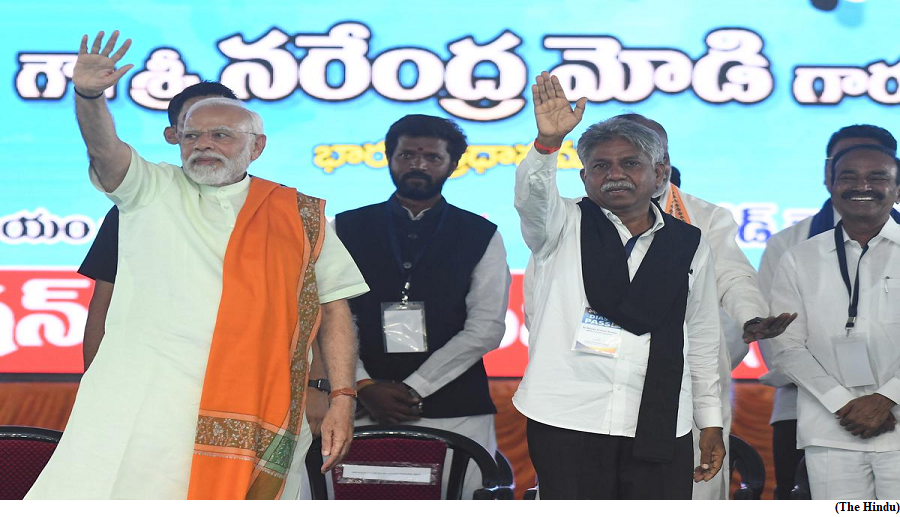On equal access to benefits for all SCs (GS Paper 2, Social Justice)

Why in news?
- The Union government has formed a high-level committee of secretaries, chaired by the Cabinet Secretary, to evaluate and work out a method for the equitable distribution of benefits, schemes and initiatives to the most backward communities among the over 1,200 Scheduled Castes (SCs) across the country, that have been crowded out by relatively forward and dominant ones.
Why this committee and why now?
- This committee’s formation is the result of a meeting Prime Minister Narendra Modi chaired in December, 2023, weeks after promising to look into the demand for sub-categorisation of Scheduled Castes as raised by the Madiga community in Telangana in the run-up to the Assembly elections there in 2023.
- The Madiga community constitutes at least 50% of the SC population in Telangana, where SCs comprise around 15% of the total population (2011 Census).
- For decades, the Madiga community has said that despite their numbers, they are crowded out of government benefits meant for SCs, including reservation, by the Mala community, another SC which is dominant and relatively forward.
Status in other states:
- Like the Madiga community, SC communities in several States have said that they have been routinely crowded out of benefits meant for SCs by dominant and relatively forward communities in their category.
- Commissions formed by State and Union governments have also supported the argument that several SC communities often miss out on benefits.
- As a result, multiple States like Punjab, Bihar, and Tamil Nadu have tried to bring in reservation laws at the State level in a bid to sub-categorise SCs and decide on a separate quantum of reservation for these subcategories within the umbrella of SCs, all of which are held up in courts.
- Consequently, this high-level panel of Secretaries has been formed with a strict mandate to look into “other ways of taking care of their grievances”.
- Meanwhile, a seven-judge Constitution Bench of the Supreme Court is expected to soon start hearing the matter of whether sub-categorisation of SCs and STs is at all permissible.
Composition:
- The Committee will consist of Secretaries from the Home Ministry, the Law Ministry, the Tribal Affairs Ministry, the Social Justice Ministry and the Department of Personnel and Training in addition to the Cabinet Secretary.
Terms of reference:
- With the question of breaking up the SC quota off the table, the panel will look into ways in which benefits of other government schemes and initiatives can be focused towards these SC communities.
- This includes ways to design special initiatives for communities that need it and focusing existing programmes and schemes towards them to ensure a more even distribution of benefits. While it has not been given a specific deadline, the committee has been asked to present its findings at the earliest.
- The panel will have to figure out on what basis SC communities are going to be shortlisted for special attention, find out the extent to which special initiatives need to be designed for each of them, and then find a way to deliver them.
- While sources have indicated that the panel has been instructed not to veer off into the question of breaking up the SC quota, nothing prevents it from forming an opinion on this matter for the government’s consideration, if necessary.
Have there been attempts in the past?
- The demand of the Madigas was raised as early as 1994, which led to the Union government seeking legal options to do the same in 2005.
- At the time, the erstwhile Attorney General of India had opined that the sub-categorisation of Scheduled Castes was possible and that the Constitution could be amended to bring this about.
- But he had also stressed that this could happen only if there was “unimpeachable evidence to indicate a necessity” for it suggesting that there needs to be a mechanism to gather empirical evidence to prove the necessity of sub-categorisation.
- At the time, both the National Commissions for Scheduled Castes (NCSC) and Scheduled Tribes (NCST) had opposed the move to amend the Constitution, arguing that just setting aside a quota within the quota would not be enough and that making sure existing schemes and benefits reach them on priority basis was more urgent.
- However, even the NCST and NCSC had in 2005 maintained that nothing in the Constitution’s Articles 341 and 342 explicitly prevented Parliament from sub-categorising SCs and STs.
- These Articles vest the powers of notifying SC and ST lists with the President of India and of creating the lists with Parliament, with no specific instruction as to whether there can be sub-categorisation within these lists respectively
- In fact, the Commissions had gone one step ahead and argued that Article 16(4) of the Constitution of India already provided for States to create special provisions for any backward classes it felt was under-represented.
Enabling provisions under Article 16:
- Article 16 in the Constitution of India refers to equality of opportunity in government jobs.
- Article 16(1) provides for equality of opportunity for all citizens in matters relating to 'employment or appointment' to any office under the State
- Article 16(2) provides that there cannot be any discrimination on grounds only of religion, race, caste, sex, descent, place of birth, residence or any of them.
- Article 16 (4) provides that the State can make any provision for the reservation of appointments or posts in favour of any backward class of citizens who, in the opinion of the state, are not adequately represented in the services under the State.
- Article 16 (4A) provides that State can make any provision for reservation in matters of promotion in favour of the Scheduled Castes and the Scheduled Tribes if they are not adequately represented in the services under the State.


